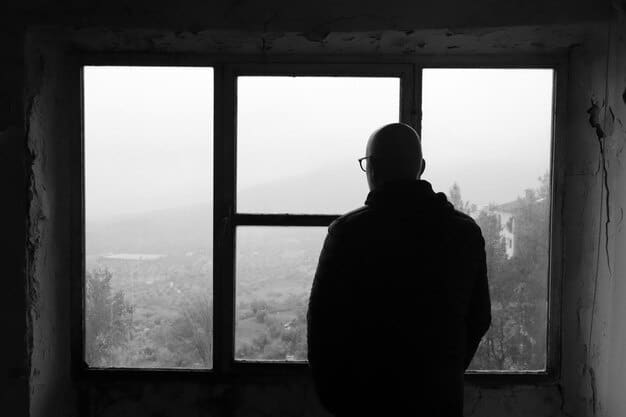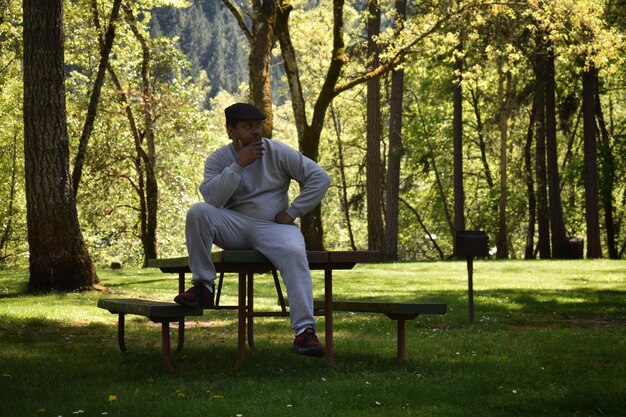Men’s Grief: Navigate Loss, Find Healing & Support

Navigating Grief: A Guide for Men Coping with Loss and Bereavement provides essential strategies and insights for men to process grief in healthy ways, challenging traditional stoicism and emphasizing the importance of emotional expression and support systems.
Losing someone dear is a universal experience, yet the way we process and express grief can be profoundly personal, often shaped by societal expectations. For men, Navigating Grief: A Guide for Men Coping with Loss and Bereavement presents unique challenges and opportunities for growth. This article explores those intricate dynamics, offering a comprehensive guide to understanding, expressing, and ultimately healing from loss.
Understanding the Male Experience of Grief
Grief, in its essence, is the natural response to loss. It encompasses a wide spectrum of emotions, thoughts, and behaviors, often appearing as a turbulent and unpredictable journey. For men, this journey can be particularly nuanced due to ingrained societal norms and traditional masculinity. These cultural constructs often encourage stoicism, self-reliance, and emotional suppression, making the open expression of vulnerability, a hallmark of healthy grieving, incredibly challenging.
Historically, men have been conditioned to “be strong” and “not cry,” leading to a suppression of feelings that can hinder the grief process. This expectation often results in men internalizing their pain, leading to delayed or complicated grief. Recognizing these deeply rooted patterns is the first step toward fostering a more openly expressive and healing environment.
Societal Expectations and Their Impact
Society often assigns men a role of protector and provider, a role that can feel incompatible with the overwhelming vulnerability that grief brings. This cultural pressure can manifest in several ways:
- 🏃♂️ **Suppressed Emotions:** Men may feel compelled to hide their sadness, anger, or fear, believing it to be a sign of weakness.
- 🗣️ **Reluctance to Talk:** A common tendency is to avoid discussions about loss, redirecting conversations or offering logical solutions instead of emotional processing.
- 💼 **”Busy” Coping Mechanisms:** Some men immerse themselves in work or other activities, viewing productivity as a way to escape sorrow.
These coping mechanisms, while providing temporary distraction, often prevent the necessary emotional processing that leads to long-term healing. It’s crucial to understand that strength is not the absence of emotion, but the courage to confront it.
Furthermore, men may experience what is known as “disenfranchised grief,” where their loss is not fully recognized or validated by society. This can happen with the loss of a pet, a miscarriage, or even the loss of a friendship, situations where men are sometimes expected to “just get over it.” This lack of validation can intensify feelings of isolation and exacerbate the difficulty of grieving openly.
Recognizing the Signs of Grief in Men
While grief is a universal experience, its manifestation can differ significantly between individuals and across genders. For men, due to various societal and personal factors, the signs of grief may not always align with conventional expectations. Instead of overt sadness, men might exhibit more controlled or internalized responses, making it crucial to be aware of these subtle, yet potent indicators.
It’s important to remember that there’s no “right” way to grieve. However, recognizing these patterns can help men, and those supporting them, identify when help or alternative coping strategies might be beneficial. Common signs can range from emotional to physical and behavioral.
Behavioral and Emotional Indicators
Beyond the obvious signs of sadness, men often display grief through behaviors that might seem disconnected from their internal pain. These signs can be a silent cry for support:
- 🚫 **Increased Isolation:** Withdrawing from social activities, friends, and family, preferring solitude over company.
- 😠 **Irritability and Anger:** Expressing grief through heightened frustration or outbursts, rather than sadness.
- ⚠️ **Substance Misuse:** Turning to alcohol, drugs, or other unhealthy habits as a means of numbing pain.
Additionally, some men might become overly focused on routine or control as a coping mechanism. This can manifest as an intense drive to work, exercise excessively, or micromanage aspects of their lives, providing a sense of order amid the chaos of loss. This can offer a temporary reprieve but can also delay genuine emotional processing.
Physical symptoms are also common, though often overlooked. Headaches, digestive issues, chronic fatigue, and even changes in appetite or sleep patterns can all be physical manifestations of emotional distress. These bodily reactions underscore the profound connection between mental and physical well-being during bereavement.

Healthy Coping Mechanisms and Strategies
Coping with grief is not about “getting over it,” but rather learning to integrate the loss into one’s life. For men, this journey often involves challenging deeply ingrained habits and embracing new, healthier ways of processing pain. The focus should be on active and constructive engagement with emotions, rather than suppression or avoidance. It requires intentional effort and a willingness to step outside comfort zones.
Finding what works best is a personal process, and it may involve a combination of strategies. The key is to find practices that allow for genuine emotional release and gradual healing, supporting both mental and physical health.
Embracing Emotional Expression
Breaking the silence is one of the most powerful steps men can take. While talking about feelings may feel unnatural at first, it’s a vital component of healing. It helps to externalize emotions, making them more manageable and less overwhelming.
- 🗣️ **Talk to Trusted Individuals:** Sharing feelings with a close friend, family member, or partner can provide immense relief and validation.
- ✍️ **Journaling:** Writing down thoughts and emotions can be a private, yet effective, way to process complex feelings without judgment.
- 🎨 **Creative Outlets:** Engaging in art, music, or other creative endeavors can provide a non-verbal channel for emotional expression.
It’s also beneficial to allow for moments of genuine emotional release, such as crying, when they occur naturally. Suppressing tears or anger can be detrimental in the long run. Creating a safe space where these emotions are permitted and even encouraged is crucial for men experiencing grief. This safety allows for authenticity, which is a cornerstone of recovery.
Furthermore, mindfulness and meditation can offer practical tools for managing the intensity of grief. Practices that encourage present-moment awareness can help men observe their emotions without being consumed by them, fostering a sense of inner calm amidst turmoil. These strategies can be integrated into daily life, offering continuous support.
The Importance of Support Systems
No one should have to navigate the complexities of grief alone. For men, who may historically be more prone to isolation, intentionally building and utilizing strong support systems is paramount. These systems offer not only emotional comfort but also practical help and validation, reinforcing that their feelings are normal and valid. Support can come in many forms, from informal connections to structured professional help.
The act of reaching out, though challenging, can significantly alter the trajectory of the grieving process, transforming it from a solitary struggle into a shared journey. It reinforces the idea that true strength lies in interdependence, not just independence.
Family, Friends, and Peer Support
The people closest to us often form the first line of defense against the overwhelming feelings of loss. Leaning on these relationships can provide essential comfort and a sense of connection.
- 👨👩👧👦 **Engage with Family:** Allow family members to offer comfort and share memories, even if it feels difficult initially.
- 🤝 **Connect with Friends:** Spend time with friends who understand and respect your need for both companionship and space.
- 👥 **Grief Support Groups:** Joining a group with others who have experienced similar losses can provide a unique sense of camaraderie and understanding.
Peer support groups, in particular, offer a non-judgmental space where shared experiences can normalize feelings and provide a sense of belonging. Hearing how others cope, or simply being present with them, can offer profound validation and practical strategies. These groups foster an environment where vulnerability is seen as a strength, breaking down barriers that often prevent men from sharing their pain openly.

Beyond formal groups, simply maintaining social connections, even through casual activities, can prevent deeper isolation. It’s about finding a balance between processing grief internally and connecting with the external world. These interactions remind men that life continues and that they are not adrift. They also provide opportunities for others to offer subtle gestures of care and support that might not be overtly sought but are deeply felt.
Professional Help: When and How to Seek It
While friends, family, and self-help strategies are invaluable, there are times when grief becomes overwhelming, impeding daily functioning and leading to prolonged distress. Recognizing when professional intervention is necessary is a sign of strength, not weakness. Mental health professionals, such as therapists, counselors, and psychologists, are equipped with the expertise to guide individuals through complex grief, offering specialized tools and a safe space for processing.
The decision to seek professional help often marks a critical turning point in the healing journey. It signifies a commitment to one’s well-being and a recognition that some challenges require expert guidance.
Identifying the Need for Professional Support
Not all grief requires professional intervention, but certain signs indicate that specialized support might be beneficial. These are red flags that daily life is being severely impacted:
- 🌙 **Persistent Sleep Disturbances:** Chronic insomnia or nightmares that significantly affect daily life.
- 🍴 **Severe Appetite Changes:** Significant weight loss or gain due to lack of interest in eating or overeating.
- 🚫 **Inability to Function:** Difficulty performing daily tasks, going to work, or caring for oneself.
- 🔗 **Chronic Feelings of Hopelessness:** Persistent despair, a lack of interest in previously enjoyed activities, or thoughts of self-harm.
These symptoms, especially when
**Navigating Grief: A Guide for Men Coping with Loss and Bereavement** focuses on their alleviation, are
not merely signs of sadness but potential indicators of complicated grief or co-occurring mental health conditions. A professional can differentiate between normal grief processes and those requiring targeted therapeutic approaches. They offer an objective perspective and evidence-based strategies tailored to individual needs.
Seeking help can feel daunting due to stigma or unfamiliarity. However, many resources exist to ease this process. Online directories, referrals from trusted doctors, or employee assistance programs are good starting points. The most important step is reaching out and being open to the support that is available.
Building Resilience and Moving Forward
Grief is not a linear process; it’s a journey with fluctuating intensity and periods of both profound sadness and unexpected moments of peace. Building resilience means developing the capacity to adapt and grow in the face of loss, rather than simply enduring it. For men, this often involves re-evaluating personal strengths, cultivating new perspectives, and finding meaning amidst pain. It’s about moving forward, not “moving on” as if the lost person ever truly leaves our hearts.
Resilience in grief is a dynamic process, requiring continuous effort and a willingness to engage in self-care. It’s a testament to the human spirit’s ability to heal and find purpose even after significant sorrow.
Finding Meaning and Purpose
One of the most transformative aspects of building resilience is finding ways to honor the memory of the lost loved one while simultaneously rediscovering one’s own purpose. This is not about forgetting, but about integrating the loss into the tapestry of one’s life.
- 🌟 **Legacy Projects:** Engaging in activities or causes that honor the deceased’s memory or passions.
- 📖 **Sharing Their Story:** Keeping their memory alive by sharing anecdotes and lessons learned.
- 🌱 **Personal Growth:** Identifying how the experience of loss has, paradoxically, contributed to personal strength and empathy.
Embracing new life chapters, even while carrying the grief, is a crucial step. This might involve setting new goals, pursuing long-deferred dreams, or simply allowing oneself to experience joy again without guilt. True resilience allows for both continued mourning and renewed engagement with life.
Practicing self-compassion is also vital. Grief can be exhausting, and it is important to treat oneself with kindness and understanding, recognizing that healing takes time and patience. Avoiding self-criticism for “not being over it yet” or for having “bad days” is essential for fostering a compassionate path forward. This acceptance fosters an environment where genuine healing can flourish at its own pace.
Dispelling Myths About Men and Grief
The conversation around men and grief is often clouded by persistent myths and misconceptions. These popular but inaccurate beliefs can hinder healthy coping, perpetuate isolation, and make the grieving process unnecessarily arduous for men. Dispelling these myths is crucial for fostering a more supportive and understanding environment, allowing men to grieve authentically without the undue pressure of societal expectations.
Understanding the reality behind these common misbeliefs can empower men to seek the support they need and encourage others to offer it without judgment. It’s about challenging outdated notions of masculinity and embracing a more compassionate view of emotional well-being.
Common Misconceptions and Realities
Several pervasive myths often dictate how men are expected to grieve, often leading to detrimental outcomes when they try to conform:
- 💪 **Myth: “Men Don’t Cry.”**
**Reality:** Crying is a natural human response to pain and loss. Suppressing tears can lead to other, less healthy, forms of emotional release or internalizing distress. - 🤫 **Myth: “Men Should Be Strong and Silent.”**
**Reality:** True strength lies in acknowledging vulnerability and seeking support. Silence often leads to isolation and delayed processing of grief. - 🏃♂️ **Myth: “Men Grieve Faster/Differently and ‘Get Over It’ Quicker.”**
**Reality:** While expression styles may differ, the depth and duration of grief are highly individual, regardless of gender. There’s no set timeline for healing.
These myths create an unnecessary burden on men, often making them feel as though their natural responses are somehow inadequate or “unmanly.” This pressure can lead to shame, further driving emotional suppression and making it harder for men to access the support they need. Challenging these ingrained beliefs is essential for a healthier collective understanding of grief.
The reality is that grief is a profoundly individual journey. While external expressions might vary, the internal experience of loss is complex and deeply personal for everyone, including men. Encouraging open dialogue, validating emotional responses, and offering unconditional support are far more beneficial than perpetuating harmful stereotypes. This shift in perspective allows for a more authentic and ultimately more healing bereavement process for all.
| Key Aspect | Brief Description |
|---|---|
| 🤔 Societal Pressure | Traditional male roles often inhibit open emotional expression, complicating grief. |
| 💪 Healthy Coping | Embrace talking, journaling, and creative outlets for emotional release. |
| 🤝 Seek Support | Lean on family, friends, peer groups, or professional help to process loss. |
| ✨ Build Resilience | Find new meaning, honor memories, and practice self-compassion to move forward. |
Frequently Asked Questions About Men and Grief
Men often express grief differently due to societal expectations that encourage stoicism and emotional suppression. While women may be more inclined to express sadness openly, men might internalize their pain, manifest it as anger or withdrawal, or rely on action-oriented coping mechanisms. However, individual responses to grief vary widely regardless of gender.
Unexpressed grief in men can manifest as increased irritability, anger, social withdrawal, escapist behaviors like substance misuse, or an excessive focus on work or hobbies. Physical symptoms like fatigue, headaches, or digestive issues can also be indicative. These signs suggest that emotions are being suppressed rather than processed.
Encouraging men to express feelings involves creating safe, non-judgmental spaces. This might include suggesting activities like journaling, engaging in physical exercise, or involving them in hands-on projects that can serve as outlets. Direct questions like “How are you feeling?” can be replaced with “What’s been on your mind lately?” or simply offering a listening ear without pressure.
Professional help is advisable if grief becomes debilitating, interfering with daily functioning, work, or relationships for an extended period. Signs include chronic despair, severe sleep disturbances, persistent thoughts of self-harm, or reliance on unhealthy coping mechanisms. A therapist specializing in grief can provide tailored support and strategies.
Yes, many communities offer grief support groups tailored specifically for men, recognizing the unique challenges they face in expressing emotions. These groups provide a safe environment where men can share experiences with peers who understand their struggles, fostering connection and reducing feelings of isolation. Online resources can help locate such groups locally.
Conclusion
Navigating Grief: A Guide for Men Coping with Loss and Bereavement underscores that grief is a deeply personal journey, unaffected by gender. While societal expectations can complicate how men express their pain, acknowledging emotions, seeking support, and building resilience are universal pathways to healing. Embracing vulnerability, challenging ingrained myths, and engaging with healthy coping mechanisms are not just acts of courage, but essential steps toward processing loss and ultimately integrating it into a life enriched by memory. True strength lies not in suppressing sorrow, but in facing it with honesty and seeking connection.





